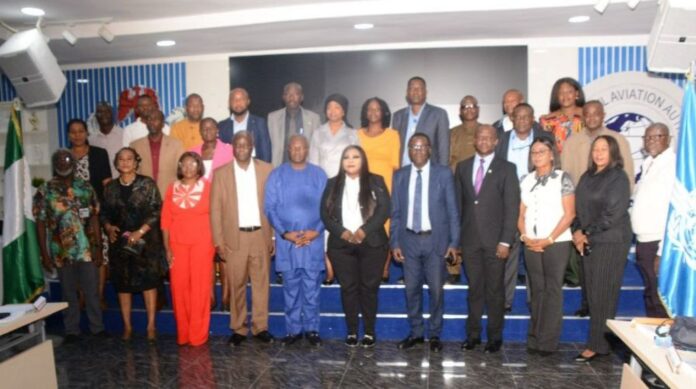The Nigeria Civil Aviation Authority (NCAA) has collaborated with the International Civil Aviation Organisation (ICAO) has begun a five-day national quality control workshop for the Universal Security Audit Programme Continuous Monitoring Approach (USAP-CMA).
The technical workshop, which started on July 21, 2025, at the NCAA’s Lagos Regional Office, aims to sharpen the country’s aviation security (AVSEC) oversight system by addressing audit findings and enhancing quality control mechanisms through global best practices.
Speaking during the opening ceremony, the director-general of civil aviation, Capt. Chris Najomo explained that the training is a strategic response to gaps identified during the ICAO USAP-CMA audit conducted in March 2024.
Najomo who was represented by the regional manager, Lagos Office, Mr Olubukola Terriba said: “The training is designed to enable stakeholders develop actionable strategies to improve the outcomes of ICAO’s security audit. This includes strengthening quality control measures, managing AVSEC-related crises more efficiently, and ensuring all aviation security measures are grounded in comprehensive risk assessment,” Capt. Najomo noted.
In his remarks, ICAO’s AVSEC Regional Officer for West and Central Africa, Mr Ademola Oladele, underscored the significance of the Organisation’s continued technical support to the NCAA.
He emphasised Nigeria’s growing aviation profile and the critical role of robust AVSEC oversight in safeguarding international civil aviation.
“Nigeria is among the most active aviation hubs on the continent. Strengthening its aviation security capabilities is not just a national priority, but a regional necessity,” Oladele noted.
The workshop attracted key AVSEC stakeholders, including NCAA’s AVSEC Director, Dr. Ben Omogo, representatives from the Federal Airports Authority of Nigeria (FAAN), commercial airlines, and technical staff from the NCAA AVSEC department.
The training is expected to culminate in strengthened national compliance with ICAO Annex 17 standards and a more proactive posture in aviation security risk management and audit readiness.

























































